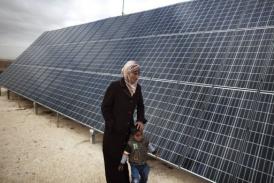
An executive with the Ministry of Industry stated that the Awqaf Authority will lead an alliance of Egyptian and Qatari industry to establish a power generation complex of solar cells in western Sinai with investments worth $165 million, reported Zawya Wednesday.
The chief executive of the Ministry of Industry’s Industrial Development Authority (IDA) said that the authority would hold a 25 per cent share in the project.
The project will be key in reducing the shortage of electricity in Egypt. The country generates approximately 23,000 Megawatts (MW) of electricity while consuming 25,000 MW on average annually, leading to power cuts especially during the summer.
The ministry plans to use solar energy stations to produce 100 MW per year, with the ambition of providing 20 per cent of power supply through renewable energy by 2020.
According to the governmental official, the IDA will award the licenses to a number of investors to build up 11 compounds for power generation from solar energy in Gulf of Suez, Red Sea and Central and Western Sinai.
A new power station producing solar energy with the capacity of 108 KW/hour daily was inaugurated in the remote village of Abo Menqar, in the governorate of Al-Wady Al-Gadid last Wednesday.
An executive at Schneider Electric, Mohamed Saad, stated that the company established lighting systems in the houses, the school and the mosque of the village using energy-efficient lamps.
Saad added that the station has a low operating and maintenance cost as it relies on solar energy in a region that enjoys a sunny climate around the year. The station is connected to the company’s headquarters in Cairo, where they have energy management strategies, solutions and integrated plans. This works parallel to automatic operation services and preventive maintenance schemes based on the statistical prediction of crashes and potential problems, so as to prevent them before they happen.

